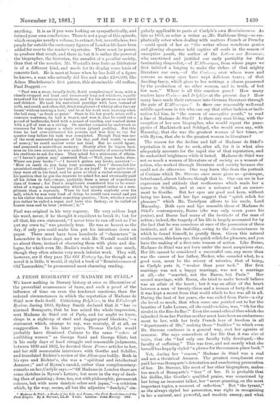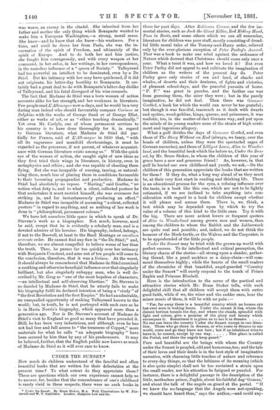A FRESH BIOGRAPHY OF MADAME DE STAEL.* WE know nothing
in literary history at once so illustrative of the proverbial evanescence of fame, and such a proof of the influence of time on even the tenderest emotions, than the reduced circumstances in which the reputation of Madame de Steel now finds itself. Criticising Delphino, in the ELliaburgh Review, during 1803, Sydney Smith declared that it "has EO alarmed Bonaparte, that he has seized the whole impression, sent Madame de Stiel out of Paris, and for aught we know, sleeps in a nightcap of steel and dagger-proof blankets,"—a statement which, strange to say, was scarcely, if at all, an exaggeration. In his later years, Thomas Carlyle would probably have dismissed. Corinne to the same " cohne of scribbling women" as George Sand and George Eliot; but in his early days of hard struggle and reasonable judgments, between 1830 and 1832, be devoted three Fraser articles to her, and, her still memorable interviews with Goethe and Schiller, and translated Richter's review of the Allemagne bodily. Both in his eyes and Richter's, she was a "spiritual and intellectual Amazon ;" and of Byrou's candid, rather than complimentary, remarks on her, Carlyle says :—" Of Madame in London there are some sketches in Byron's Letters, but more in the way of daub- ing than of painting ; done, too, not with philosophic, permanent colours, but with mere dandyic ochre and japan,"—a criticism which, by the way, seems, all but the adjective " dandyic," sin- • Madame de Stdel ; a Study of her Life and Times,—the First Revolution and the First Empire. By A. Stevens, LLD. 2 vols. London ; John Murray. IS91. gularly applicable to parts of Carlyle's own Reminiscences. As late as 1853, so sober a writer as .Mr. Rathbone Greg—so em- phatically sober when dealing with matters French or Frenchy —could speak of her as "the writer whose wondrous genius and glowing eloquence held captive all souls in the season of susceptive youth, the author of the Lettms sur Rousseau, who sanctioned and justified our early partiality for that fascinating rhapsodist,—of L'Allemagne, from whose pages we- first imbibed a longing to make the riches of that mighty literature our own,—of the Corinne, over whose woes and sorrows so many eyes have wept delicious tears ; of that dazzling fancy, which gives to her writings a charm possessed by the production of no other woman, and in truth, of but few men." Where is all this emotion gone ? How many readers have Corinne and Delphine at the present day ? How many have made their entrance into German literature through the gate of L'Allentagne ? Is there one reasonably well-react middle-aged man in ten who can say that either fashion or incli- nation led him, in "the season of susceptive youth," to react a line of Madame de Stud? Is there any man living, with the exception of her new biographer, who would repeat the pane- gyrics of Mackintosh and Schlegel, who would even say, with Macaulay, that she was the greatest woman of her times, or with Byron, that she is the greatest womau in literature ?
The reason for the decline and fall of Madame de Stiiel's reputation is not far to seek, after all, for it is what also. adequately accounts for the rapid rise of that reputation, and its undoubted brightness while it lasted. Madame de Sad was not so much a woman of literature or of society as a woman of action, who worked. through literature and society because she could not do otherwise. One may learn this from the portrait of Corinne which Dr. Stevens once more gives us—grotesque,. beturbaned, almost hideous though that is. One can see in her expression and attitude that restlessness which made her a terror to Schiller, and at once a nuisance and an amuse- ment to Goethe. But her eyes are good and keen, without. being too keen, and her lips suggest that "quick relish for pleasure" which Mr. Trevelyan allows to his uncle, Lord Macaulay. Both eyes and lips resemble those of Madame de Stael's contemporary, Burns (she was only seven years his junior), and Burns had many of the instincts of the man of action ; indeed, the tragedy of his life is largely accounted for by the fact that he was conscious at once of the possession of these instincts, and of his inability, owing to the circumstances in which he found himself, to gratify them. Given this natural restlessness, this keen eye, this quick relish for pleasure, and you have the making of a first-rate woman of action. Like Burns, Madame de Stiiel was not born under the most auspicious star.. Her life cannot be considered a successful one, any more than was the career of her father, Necker, who sounded what, to a good man, must be the misery of miseries, that of being, as Carlyle puts it, "weaker than your task." Her first marriage was not a happy marriage, was not a marriage at all,—she "married, not the Baron, but Paris." Her second marriage, with Rocca, she tried to make herself believe was an affair of the heart ; but it was an affair of the heart between a man of twenty-three and a ivoman of forty-five, and. it was kept a secret from that world which to her was all in all.. During the best of her years, she was exiled from Paris—a city she loved so much, that when some one pointed out to her the beauties of Lake Leman, all she could exclaim, was, "Oh for the rivulet in the Rue du Bac !" Even the sound ethical fibre which she inherited from her Puritan mother must have been an embarrass- ment to her, with her truly French love of freedom in all "departments of life," making those " frailties" to which even Dr. Stevens confesses in a general way, cost her agonies of remorse. She says somewhere of her life that it was vice et (rate, that she "had only one faculty fully developed,—the faculty of suffering." This was true, and not merely what she herself has happily styled "a phrase for the common-place book."
Yet, during her "season," Madame de Stiiel was a real and not a theatrical Amazon. The greatest compliment ever paid her was Bonaparte's detestation and unrelenting persecution of her. Dr. Stevens, like most of her other biographers, makes • too much of Bonaparte's " fear " of her. It is probable that his dislike, like Goethe's qualified praise, was occasioned by her being an incessant talker, her "never granting, on the most important topics, a moment of reflection." But "the tyrant," as he always styled her persecutor, was right in recognising in her a natural, and powerful, and resolute enemy, and what was worse, an enemy in the citadel. She inherited from her father and mother the only thing which Bonaparte wanted to make him a European Washington,—a strong, moral sense. She knew—and he knew that she knew—his weakness. For a time and until he drove her from Paris, she was the in- carnation of the spirit of Freedom, and ultimately of the spirit of Europe. And to do both her and him justice, she fought him courageously, and with every weapon at her command, in her salon, in her writings, in her correspondence, in the nameless influence of a "queen of Society." Talleyrand had too powerful an intellect to be dominated, even by a De Stael. But his intimacy with her may have quickened, if it did not originate, his latter-day hostility to Bonaparte. It cer- tainly had a great deal to do with Bonaparte's latter-day dislike of Talleyrand, and his fatal disregard of his wise counsels.
The fact that Madame de Stael was a born woman of action accounts alike for her strength and her weakness in literature. Few people read L' Allemagne now-a-days, and he would be a very daring man indeed who should favourably compare Corinne or Del phine with the works of George Sand or of George Eliot, either as works of art, or as "ethics teaching dramatically." Yet even Mr. Carlyle, one of whose permanent services to his country is to have done thoroughly for it, in regard to German literature, what Madame de Stael did par- tially for France, said of L'Allemagne in 1830 that, "with all its vagueness and manifold shortcomings, it must be regarded as the precursor, if not parent, of whatever acquaint- ance with German literature exists among us." With the quick eye of the woman of action, she caught sight of new ideas as they first tried their wings in literature, in history, even in metaphysics and ethics ; and she was capable of shooting them flying. But she was incapable of nursing, taming, or natural- ising them, much less of placing them in conditions favourable to their becoming propagandist and productive. Madame de Stael had absolutely no repose. "Having," said Goethe, "no notion what duty is, and to what a silent, collected posture he that undertakes it mast restrict himself, she was evermore for striking in, and for instantaneously producing an effect." Madame de Stael was incapable of assuming "a silent, collected posture" in regard to anything, and so nothing of her work is done in " philosophical, permanent colours."
We have left ourselves little space in which to speak of Dr. Stevens's work as a biographer. Not much, however, need be said, except that he is evidently a scholarly man, and is a devoted admirer of his heroine. His biography, indeed, belongs, if not to the Boswell, at least to the Basil Montagn or cavaliere servente order. He cannot find any flaw in "the De Stael;" and, therefore, we are almost compelled to believe worse of her than the truth. Thus, he passes far too quickly over her intimacy with Benjamin Constant, and nine out of ten people will come to the conclusion, therefore, that it was a liaison. At the worst, it should always be remembered that Madame de Stael exercised a soothing and otherwise benefieial influence over that singularly brilliant, but also singularly unhappy man, who is well de- scribed by Mr. Greg as "one of the most hopeless of characters, —an intellectual and self-observing libertine." Dr. Stevens is so dazzled by Madame de Stael, that he utterly fails to make his biography fulfil its declared intention of being a "study" of 4' the first Revolution and the first Empire." He had an admirable, an unequalled opportunity of making Talleyrand known to the world; but, in truth, he is not portrayed with such care as he is in Maria Norris's biography, which appeared more than a generation ago. Nor is Dr. Stevens's account of Madame de Stael's visit to England so good as many that have preceded it. Still, he has been very industrious, and although even he has not had free and full access to "the treasures of Coppet," more materials for what he calls "an adequate biography "have been secured by him than by any of his predecessors. It may be believed, further, that the English public now knows as much .of Madame de Stael as it will ever care to know.



































 Previous page
Previous page